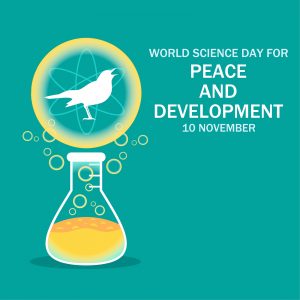 Celebrated every 10 November, World Science Day for Peace and Development highlights the significant role of science in society and the need to engage the wider public in debates on emerging scientific issues. It also underlines the importance and relevance of science in our daily lives.
Celebrated every 10 November, World Science Day for Peace and Development highlights the significant role of science in society and the need to engage the wider public in debates on emerging scientific issues. It also underlines the importance and relevance of science in our daily lives.
By linking science more closely with society, World Science Day for Peace and Development aims to ensure that citizens are kept informed of developments in science. It also underscores the role scientists play in broadening our understanding of the remarkable, fragile planet we call home and in making our societies more sustainable.
‘The applications of basic sciences are vital for advances in medicine, industry, agriculture, water resources, energy planning, environment, communications and culture’, affirmed the United Nations General Assembly on 2 December 2021, when it endorsed the proposal for an International Year of Basic Sciences for Sustainable Development. World Science Day is contributing to the Year in 2022 by celebrating this theme.
‘We need more basic science to achieve The 2030 Agenda and its 17 Sustainable Development Goals’, the United Nations General Assembly noted in December 2021. It is true that the share of domestic research expenditure devoted to basic sciences varies widely from one country to another. According to data from the UNESCO Science Report 2021 for 86 countries, some devote less than 10% of their research expenditure to basic sciences and others more than 30%.
Having a capacity in basic sciences is in the interests of both developed and developing countries, given the potential for applications to foster sustainable development and raise standards of living. For example, a growing number of people around the world suffer from diabetes. Thanks to laboratory studies of the ways in which genes can be manipulated to make specific protein molecules, scientists are able to engineer genetically a common bacterium, Escherichia coli, to produce synthetic human insulin.
Source: Text: https://www.un.org/en/observances/world-science-day Image: news 18.com